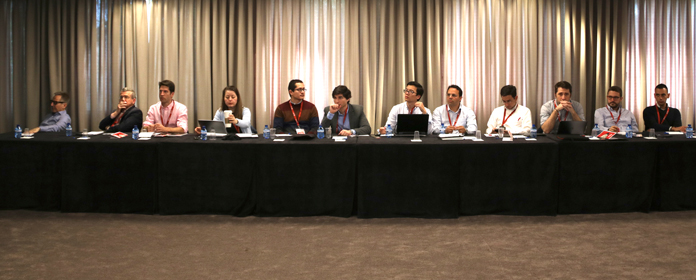Debt, economic inequality and the impact of financial fluctuations, topics discussed at the VII NCID Research Workshop
The event was held at the headquarters of the Ramón Areces Foundation and was attended by Martín Uribe, Full Professor of Economics of Columbia University.

PHOTO: David Soler
The great financial crisis has changed the way economists and policy makers analyze economic fluctuations, macroeconomic policy and its impact on long-term growth deadline. The 7th Navarra Center for International Development (NCID) Research Workshop brought together leading researchers to discuss the challenges facing countries at development such as the impact of financial fluctuations, waves of protectionism, low productivity, rising debt and inequality.
The academic event was held on May 18 at the headquarters of the Ramón Areces Foundation and featured seven guest economists who presented their research. The keynote speaker at congress was Martín Uribe, Full Professor of Economics at Columbia University.
The economist presented his study on the indebtedness and borrowing capacity of emerging countries. Uribe argued that citizens' fear of a bad economic period leads to extreme savings that are inefficient for a country's growth.
Javier Bianchi: "Countries like Spain are vulnerable to a refinancing crisis because they are in a monetary union".He was followed by the rest of the speakers. Pablo Guerrón-Quintana, Full Professor of Boston College discussed the importance of migration for GDP in U.S. cities. "Eliminating all subject movement of people between cities would lower GDP by 15%," he said.
He was followed by Mirko Abbritti, researcher resident at NCID and Javier Bianchi, economist at reservation Federal of Minneapolis. The former discussed the impact of exporting companies on the trade balance of emerging countries, while the latter presented his research on debt refinancing crises. According to Bianchi, "when a country submission its monetary independence, either because it joins the euro or because it fixes its exchange rate subject , it becomes much more vulnerable to a refinancing crisis".
The last three speakers discussed the drawbacks of unequal and non-inclusive economic growth and globalization.In the afternoon, the workshop was closed by three speakers who discussed finance and inequality. Jesús Fernández-Villaverde, Full Professor of Economics at the University of Pennsylvania, argued that an adequate distribution of wealth is very important in economies with financial frictions.
The Deputy Director of research of the International Monetary Fund (IMF), Jonathan D. Ostry, also addressed the distribution of wealth and stated that the waves of protectionism are due to a globalization that has brought greater inequality. For there to be sustainable growth, Ostry said that "there must be an adequate distribution of wealth and inclusive growth within the processes of globalization".
The last to present her research was IMF economist Camelia Minoiu, who closed the seventh congress of NCID's research with her presentation on financial inclusion and the importance of microfinance. "The microfinance sector is crucial for financial development ," she concluded.
